While the coronavirus pandemic has forced many sectors of society to shut down their operations, one commodity has been available throughout all the stay-at-home measures — public transportation.
At Long Beach Transit, new health and safety measures have led to rear-door boarding, a decision that has resulted in a lack of bus fare enforcement and an overall revenue loss for the company.
Operating across 100 square miles spanning 14 cities in Los Angeles and Orange counties, LBT has continued providing public transportation under Centers for Disease Control regulations, free bus rides and modified routes since March 22, 2020.
Sierra Allen, a third-year international business major at Long Beach State, has been riding Long Beach buses “almost every day” since the beginning of the pandemic and said “it’s been pretty smooth sailing.”
“Everyone seems to understand that we are in the middle of a pandemic and the reason why we’re doing this is because we don’t have another choice,” Allen said. “We have to get around, we have to go grocery shopping, we have to do this, we have to do that, but we just all don’t have cars. ”
According to the company’s fiscal year 2021 budget, LBT had been facing a steep decline in fare revenue since the beginning of 2020, bringing in $767,791 in February but just $432,417 in March, a decrease of 43.7%.
LBT made only $2,205 from bus fares in April, just $684 in May and $722 in June. From February to June, LBT faced a fare revenue decrease of 99.9%.
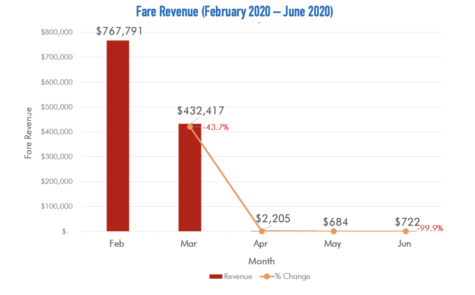
Following the first reported cases of COVID-19 in the country, LBT implemented its preventive measures last February. According to Mike Gold, LBT’s executive director and vice president of customer relations, all buses are cleaned several times per day by cleaning crews, once in the mornings and during bus returns and layovers.
Gold said that the cleaning crews mainly disinfect buses’ “high-touch areas,” like doors, panels, handrails, seats, pull cords and interior window frames. Face masks are required while aboard buses “to help protect LBT bus operators and customers.”
Allen said she hasn’t personally seen any cleaning crews while using public transit, though she feels drivers and passengers understand the importance of enforcing health regulations.
An LBT bus driver, who asked to remain anonymous, said he has felt overwhelmed operating a bus during the pandemic, having to take several regulations into account that he didn’t have to in previous years.
“It is stressful, I can tell you that,” he said.
The driver said he was not at liberty to discuss details of his experience as a bus operator due to regulations from the company.
Manuel Aguilar, a third-year psychology major at CSULB, said his main concern with public transportation is his physical safety, though he feels drivers have “done well to make sure everyone on board has masks.”
He said he felt that social distancing is “practically non-existent” when the buses are busy.
“I try to avoid touching anything directly,” Aguilar said.
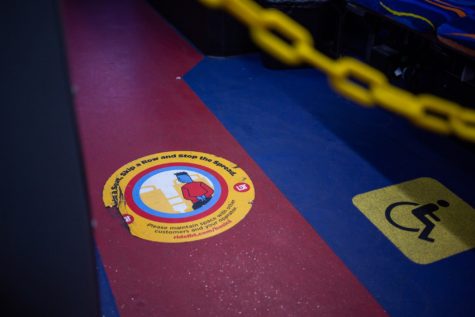
Buses don’t provide any personal protective equipment, though Allen said this doesn’t bother her since she carries her own sanitizer wherever she goes.
“I don’t really have another choice other than taking the bus to get around, but maybe if I did have a choice, having sanitizer, having stuff like that made readily available would definitely make me be like, ‘Okay, I’m not risking my life to go to McDonald’s,’” she said.
To prevent contact with the driver, LBT has had passengers board through the rear door, and front areas have chain barriers. Travelers are also asked to “skip a seat or row,” Gold said.
“People will stand rather than take that extra seat,” Allen said. “That seems to be pretty understood.”
Allen feels that riders are conscientious of personal space and feels there is “a universal understanding of like ‘Okay, I’m not going to try to talk to her, I’m not going to sit next to her,’ even if even if there’s no seats left.”
While rear boarding remains in effect, payment will not be collected at the machines located at the front entrances. Gold said drivers are “not enforcing” bus fares, and passes like student TAP cards are not being purchased or used during this time.
“I do appreciate that they made the fare free during the pandemic, and it has been a great way to get around without having to spend money to Uber [or] Lyft,” Aguilar said.
Rear-door boarding is set to continue for the foreseeable future, though passengers needing a ramp may enter at the front.
With a lack of revenue coming in from fares and bus passes, LBT is facing a deficit period, though Gold confirmed that all transit agencies “did receive some money from the federal government” as part of the first COVID-19 relief package last year.
“We continue to lobby, it’s not just us, it’s kind of all transit agencies, for additional assistance because of the impacts of COVID on ridership,” Gold said.
Gold said he expects LBT to be reimbursed by the Federal Emergency Management Agency since the country was in a state of emergency. The Biden administration is calling for $20 million in aid to go toward “the hardest hit public transit agencies,” according to the president’s American Rescue Plan.
“That’s a proposal that’s potentially going to Congress that would also make up for lost revenues that transit agencies nationwide have faced as a result of COVID,” Gold said.
For the 2021 fiscal year, LBT anticipates an overall decrease of 58% in fare revenue in comparison to the previous year’s budget, estimating a total of $5.86 million. The estimated fare revenue for 2020 was $14.26 million.
Several routes have been temporarily suspended and others have been condensed to weekday-only service since last March. Routes 52, 81, 96, 102, 131, 176 and Passport are all halted for the time being.
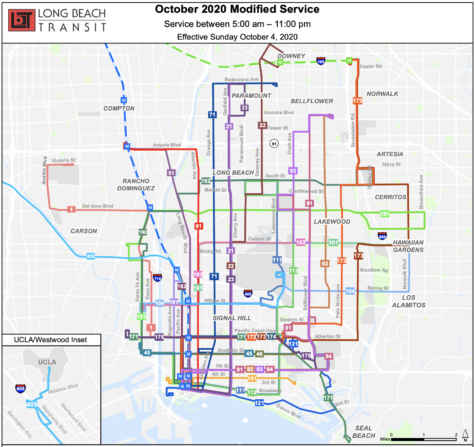
Currently, routes 45 and 46 are not serving CSULB, and routes 92, 93, 175 and the UCLA/Westwood Commuter Express are only operating on weekdays.
Allen maintained that despite the changes in operation, drivers have been generally running “as smooth and easy as possible” under new regulations.
“They get it, like they are on this bus all day, and they’re doing it for the same reason that we all are [who are] still working in the middle of a pandemic — they have to make a paycheck,” Allen said. “I think that they’re doing the best that they can, given the resources that they have.”

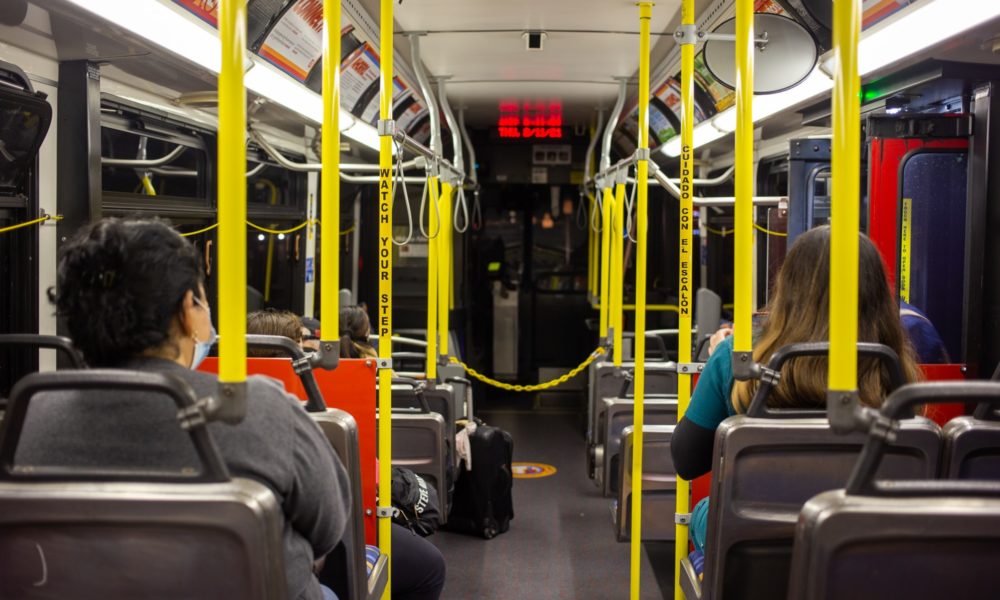
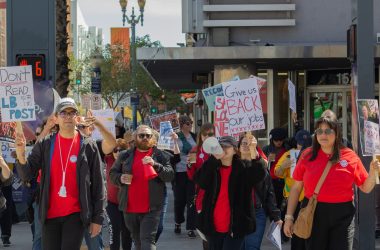


Pingback: Empty parking lots now, clean air tomorrow - Daily Forty-Niner